The Best Healthy recipes & Workout you will fall in love with. Full of tips and tricks to help you make the best Version of You .
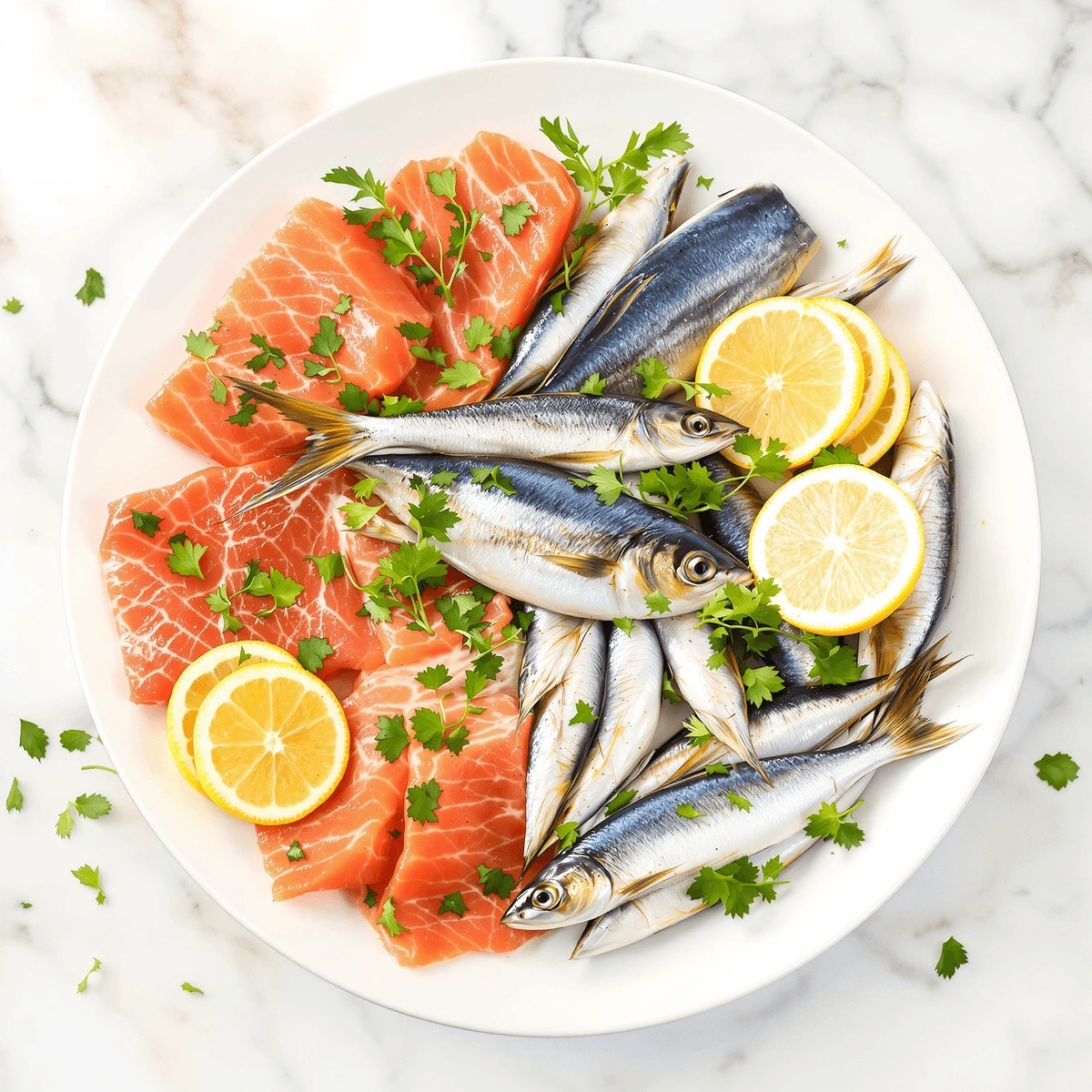
Table of Contents
Table of Contents
Good Foods for Brain Function
Your brain is the control center of your body, managing everything from basic functions to complex thinking tasks. Consuming good food for brain function is essential for keeping it working at its best and preventing decline in cognitive abilities.
Studies indicate that certain food choices can improve memory, concentration, and mental clarity. The MIND Diet (Mediterranean-DASH Intervention for Neurodegenerative Delay) combines scientifically proven foods that promote brain health. This diet focuses on nutrient-rich ingredients that:
- Reduce inflammation in the brain
- Support the creation of new neural connections
- Protect against oxidative damage
- Ensure proper blood flow to the brain
Knowing which foods nourish your brain can empower you to make better choices for long-term cognitive health.
Key Foods for Enhancing Brain Power
1. Fatty Fish
Fatty fish is a great food for your brain. It contains important omega-3 fatty acids called DHA and EPA, which are essential for the health of your brain cells and the proper functioning of neurotransmitters.
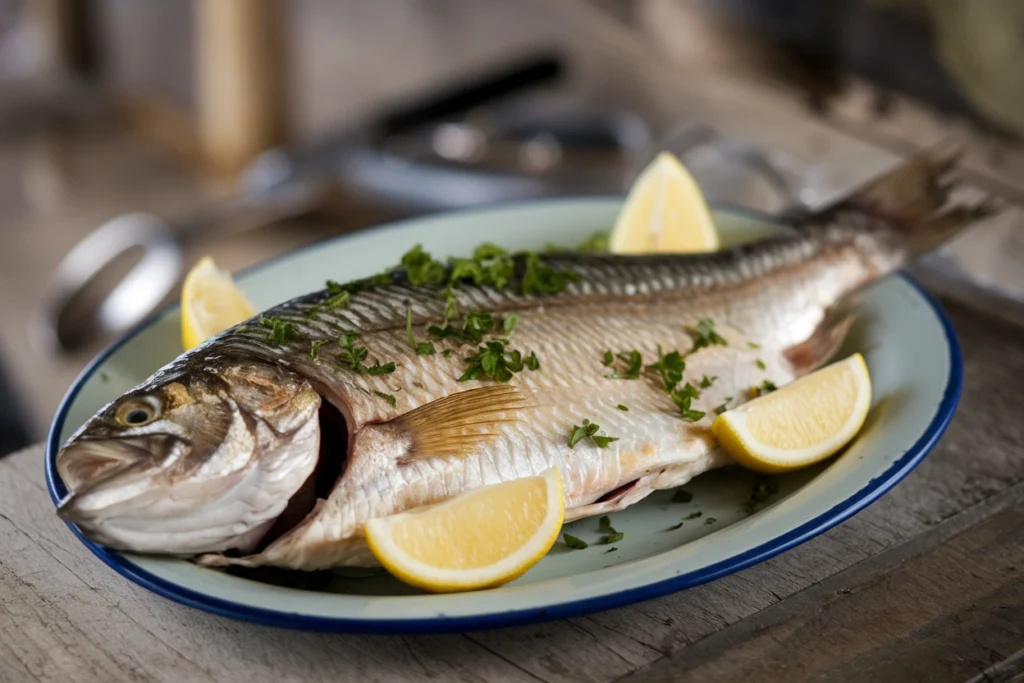
Studies have shown that eating fish rich in omega-3s on a regular basis can:
- Improve memory
- Slow down cognitive decline
- Protect brain tissue from inflammation
- Promote the growth of new neural connections
Top Sources of Brain-Boosting Fatty Fish:
- Wild-caught salmon
- Mackerel
- Sardines
- Herring
- Anchovies
The American Heart Association recommends eating fatty fish at least twice per week. If you don’t eat fish often, high-quality fish oil supplements can offer similar benefits, but whole food sources are still the best option.
Research suggests that individuals who consume fish regularly have more gray matter in their brains, particularly in areas associated with memory and emotional regulation. This increase in brain volume may lead to improved cognitive function and a lower risk of age-related mental decline.
Here’s a practical tip: Whenever possible, choose wild-caught fish instead of farm-raised varieties, as they generally contain higher amounts of omega-3s. To create a well-rounded meal that boosts your brain health, combine your fish with leafy greens or whole grains.
2. Berries
Berries are a great choice for brain health, especially blueberries, which are known as nature’s brain food. These small fruits are packed with flavonoids, which are plant compounds that give them their bright colors and have protective benefits for the brain.
Benefits of Blueberries for the Brain
Studies have shown that blueberries can:
- Improve memory and how quickly we think
- Slow down brain aging by up to 2.5 years
- Enhance our ability to learn
- Increase focus during long tasks
Other Berries That Are Good for the Brain
In addition to blueberries, there are other berries that can also boost brain health:
- Strawberries – high in iodine and vitamin C
- Blackberries – rich in antioxidants
- Acai berries – loaded with omega-3 fatty acids and amino acids
The antioxidants found in berries work at a cellular level, protecting brain cells from harm and reducing inflammation. These compounds can cross the blood-brain barrier, directly supporting communication between neurons and promoting the growth of new brain cells, especially in areas associated with memory and learning.
3. Nuts and Seeds
Nuts and seeds are incredibly beneficial for brain health. Walnuts, which resemble small brains, are packed with alpha-linolenic acid (ALA), an essential omega-3 fatty acid that plays a vital role in cognitive function.
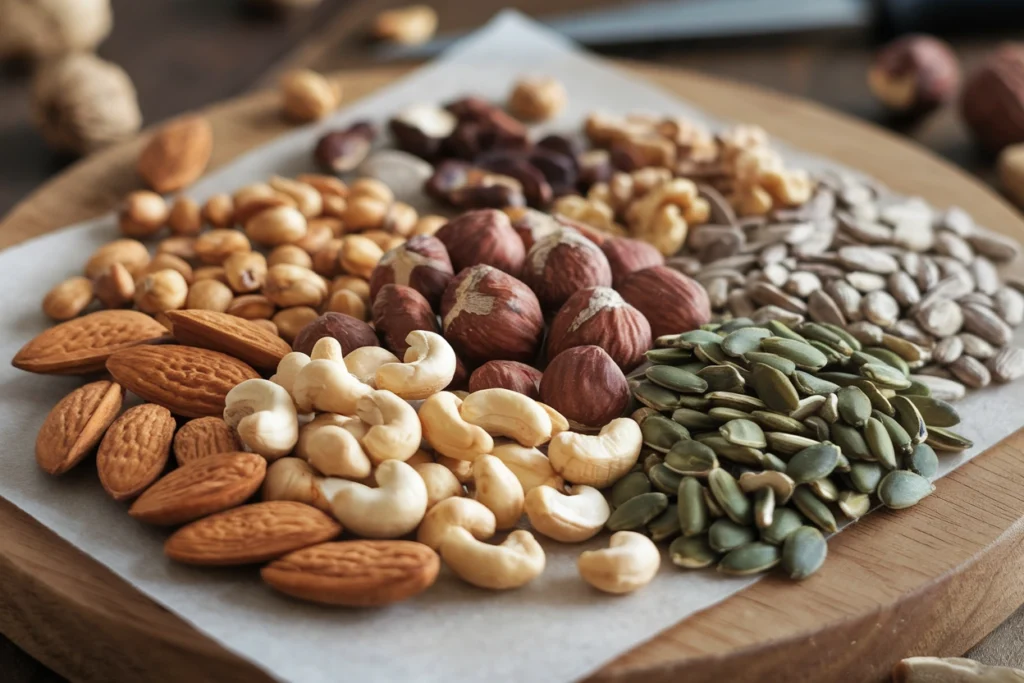
Research has shown that regularly including these foods in your diet can:
- Improve memory retention
- Enhance problem-solving abilities
- Protect brain cells from oxidative stress
- Support communication between neurons
Other nutritious options to consider are:
- Pumpkin seeds – rich in zinc and magnesium, which can help reduce stress
- Almonds – packed with vitamin E, known for its protective effects on the brain
- Flaxseeds – a great source of ALA omega-3 fatty acids
To reap the maximum benefits for your brain, aim for a daily serving of mixed nuts and seeds (around 1-2 ounces). Research suggests that incorporating this simple dietary change can slow down cognitive decline and help maintain mental sharpness as we grow older.
4. Dark Chocolate
Dark chocolate is a powerful brain-boosting food, packed with beneficial compounds called flavonoids. These natural compounds can cross into the brain and directly support brain health and cognitive function.
Research shows dark chocolate’s impressive effects on brain activity:
- Enhanced Memory: Regular consumption improves spatial memory and reaction time
- Mood Elevation: Triggers the release of endorphins and serotonin
- Mental Alertness: Increases blood flow to the brain, boosting focus
The key is to choose dark chocolate with at least 70% cocoa content. A daily serving of 1-2 squares provides optimal benefits without excess sugar or calories.
Studies suggest that the flavonoids in dark chocolate may help protect brain cells from damage caused by oxidative stress, potentially lowering the risk of age-related cognitive decline. These compounds also promote the growth of new neurons, which is important for learning and memory formation.
5. Green Leafy Vegetables
Green leafy vegetables are nutritional powerhouses for brain health. These vegetables pack essential nutrients that support cognitive function:
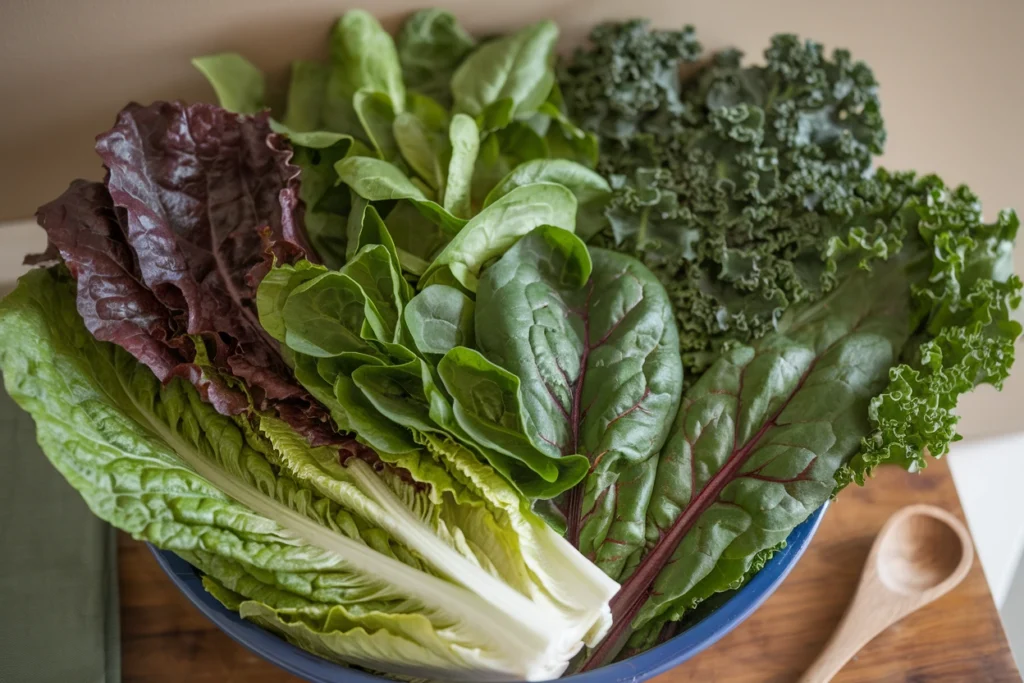
- Kale: Rich in vitamins K, A, and C, kale helps build stronger neural pathways
- Spinach: Contains high levels of folate and iron, crucial for memory formation
- Broccoli: Packed with vitamin K and glucosinolates that protect against oxidative stress
Research shows that people who eat one serving of leafy greens daily experience slower cognitive decline, equivalent to being 11 years younger mentally. These vegetables contain lutein, a plant compound that accumulates in brain tissue, enhancing memory and learning capabilities.
A daily serving of 1-2 cups of raw leafy greens provides the recommended intake of brain-boosting nutrients. Try adding them to smoothies, salads, or sautéed dishes to maximize their benefits.
6. Whole Grains
Whole grains are the main source of energy for the brain, providing a steady supply of energy throughout the day. Foods like quinoa, brown rice, and oats contain complex carbohydrates that are digested slowly, keeping blood sugar levels stable and ensuring optimal brain function.
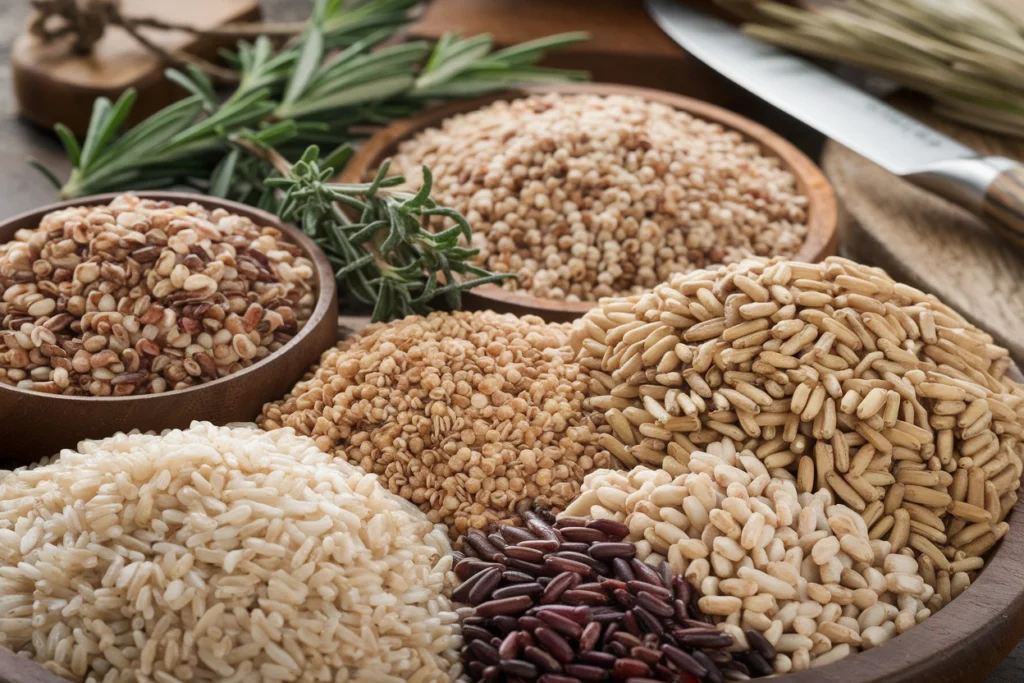
These nutritious grains are packed with:
- Vitamin E – which protects brain cells from damage
- B vitamins – which aid in the production of neurotransmitters
- Fiber – which helps maintain steady glucose levels for consistent mental energy
Studies suggest that regularly eating whole grains may help reduce inflammation in the brain and lower the risk of cognitive decline. According to research published in the Journal of Nutrition, participants who consumed more whole grains had better memory performance and increased attention span compared to those who ate refined grains.
7. Eggs
Eggs are a nutritional powerhouse for brain health, packed with essential B vitamins that support cognitive function. A single egg contains significant amounts of:
- Vitamin B6: Essential for neurotransmitter production
- Vitamin B12: Supports myelin formation around nerve cells
- Folate: Critical for proper brain development
These B vitamins work together to regulate homocysteine levels in the blood – high levels of which have been linked to cognitive decline. The yolk also contains choline, a crucial nutrient for memory and brain development. Research suggests that regular egg consumption helps maintain healthy brain function and may reduce the risk of neurodegenerative disorders.
For maximum brain benefits, opt for omega-3 enriched eggs from hens fed a specialized diet. These eggs provide additional brain-boosting nutrients beyond their natural B vitamin content.
8. Coffee
Coffee does more than just wake us up in the morning. It turns out that drinking coffee regularly might actually lower our chances of developing brain diseases like Alzheimer’s and Parkinson’s.
What Makes Coffee So Good for Our Brains?
The secret behind coffee’s brain-boosting powers lies in its natural compounds:
- Caffeine – This ingredient blocks a chemical called adenosine, which helps improve communication in the brain and makes us think better.
- Antioxidants – These substances protect our brain cells from damage caused by harmful molecules.
- Chlorogenic acid – This compound helps reduce inflammation and promotes overall brain health.
How Does Coffee Benefit Our Thinking Skills?
Research has shown that people who drink coffee tend to perform better on various mental tasks compared to those who don’t. Here are some specific areas where coffee drinkers excel:
- Memory retention
- Focus and concentration
- Problem-solving abilities
- Reaction times
How Much Coffee Should We Drink?
While the exact amount may vary from person to person, studies suggest that consuming about 3-5 cups of coffee each day is likely to provide the most cognitive benefits. However, it’s important to note that everyone has different tolerance levels when it comes to caffeine.
What’s the Best Way to Enjoy Coffee for Brain Benefits?
If you want to maximize the positive effects of coffee on your brain, it’s best to stick with black coffee. This means avoiding any added sugars or artificial sweeteners, as these can potentially lessen the benefits we get from our favorite beverage.
9. Turmeric
The golden spice turmeric contains a powerful compound called curcumin that crosses the blood-brain barrier to directly benefit your brain cells. Research shows curcumin can:
- Boost levels of BDNF (Brain-Derived Neurotrophic Factor) – a protein that stimulates the creation of new neurons
- Clear amyloid plaques associated with Alzheimer’s disease
- Reduce inflammation in brain tissue
- Improve memory and attention in older adults
To maximize curcumin absorption, combine turmeric with black pepper and healthy fats. Try adding this vibrant spice to:
- Curry dishes
- Golden milk lattes
- Smoothies
- Roasted vegetables
- Rice dishes
Pro tip: Look for supplements that contain both curcumin and piperine (black pepper extract) for enhanced bioavailability.
FAQs (Frequently Asked Questions)
What are the key foods that enhance brain power?
Key foods for enhancing brain power include fatty fish, berries, nuts and seeds, dark chocolate, green leafy vegetables, whole grains, eggs, coffee, and turmeric. Each of these foods contributes specific nutrients and compounds that support cognitive health.
How do omega-3 fatty acids benefit brain function?
Omega-3 fatty acids are essential for brain and nerve cell health. They are linked to memory enhancement and can help reduce age-related mental decline. Fatty fish like salmon and sardines are excellent sources of omega-3s.
Which type of berries is particularly beneficial for brain health?
Blueberries are particularly beneficial for brain health due to their high antioxidant content. Antioxidants help reduce inflammation and improve communication between brain cells, which can enhance cognitive function.
What role do nuts and seeds play in supporting cognitive health?
Nuts and seeds, especially walnuts, contain alpha-linolenic acid (ALA), which supports brain function. Consuming these foods can be particularly beneficial for maintaining cognitive health as we age.
How does dark chocolate affect mood and memory?
Dark chocolate contains flavonoids that have antioxidant effects. These compounds can enhance mood and improve memory by promoting better blood flow to the brain.
What nutrients in eggs contribute to brain health?
Eggs are a good source of B vitamins such as B6, B12, and folate, which are important for maintaining overall brain health. These nutrients play a crucial role in energy production and neurotransmitter function.




